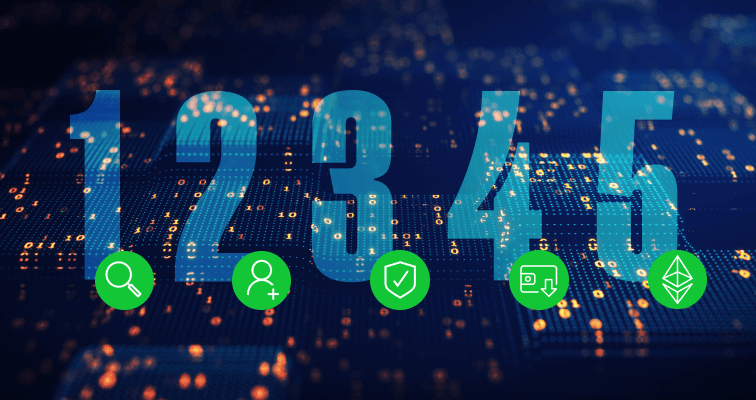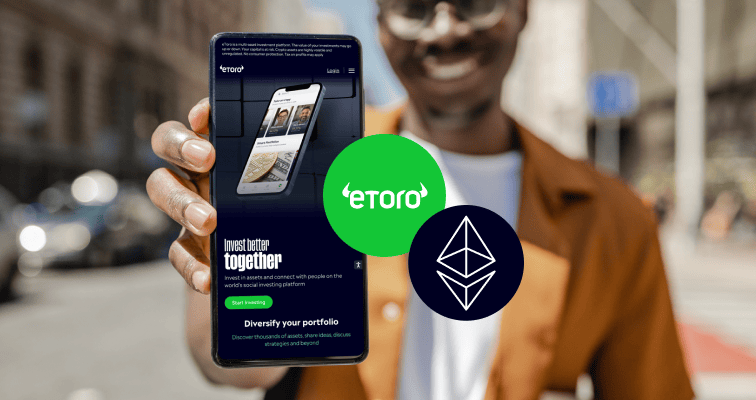Ethereum is one of the most well respected blockchain networks, but how do you start buying ETH for the first time? Learn how to buy Ethereum (ETH) and where to store it safely.
Introduction to Ethereum (ETH)
Ethereum (ETH) is a decentralised, open-source blockchain network. It features smart contract functionality and is the second-largest cryptocurrency by market capitalisation. The Ethereum protocol has seen significant growth since it was launched in 2015.
Ethereum enables users to create digital contracts, tokenise assets and create decentralised applications (dApps). DApps are open-source software programs that are run and operated by a decentralised network of computers, rather than one centralised server or data centre.
To learn more about Ethereum and its features, read our “What is Ethereum (ETH)?” article.
The community has built a booming digital economy, bold new ways for creators to earn online, and so much more. It’s open to everyone, wherever you are in the world — all you need is the internet.
Ethereum

Where to buy Ethereum
Once you have decided to purchase Ethereum, the next step is to find a cryptocurrency exchange on which you can buy it. Many reputable exchanges and brokers, such as eToro, offer the option to buy ETH.
When selecting a platform to buy Ethereum (ETH), there are several factors to consider, such as fees, security measures, payment methods and customer support. It is important to compare different providers before making your decision.
The two most popular options for buying Ethereum are centralised exchanges (CEXs) and decentralised exchanges (DEXs).
Tip: Ethereum (ETH) and Ethereum Classic (ETC) are two separate cryptocurrencies with a shared history.
How to keep and store Ethereum
The best way to keep your Ethereum (ETH) secure is by using a cryptocurrency wallet. There are two main types of wallets:
- Hot wallets: Software-based wallets for active traders. Hot wallets are usually accessible on desktops, mobile phones or as browser extensions. It is important to be cautious of potential security risks and cyberattacks when using hot wallets.
- Cold wallets: Physical devices providing enhanced security. Cold wallets can be used to store ETH, although this storage solution is best suited to those who trade less frequently.
Ethereum (ETH) wallets should be chosen based on your trading habits, the cryptocurrencies you hold, your security preferences and the costs associated with the wallet itself.
For those looking to buy and store ETH specifically, here are some great options:
- eToro Money: A user-friendly app-based wallet for storing multiple cryptocurrencies, including Ethereum. The eToro Money wallet includes DDoS protection and private security keys.
- Ledger: A suite of physical storage devices, Ledger offers a range of cold wallet solutions for storing ETH and other cryptocurrencies.
- Exodus: A multi-chain storage solution for Ethereum that can be accessed as a mobile or desktop wallet.

Learn more about Ethereum
Ethereum is one of the world’s leading blockchain networks. While Bitcoin has been criticised for its limited use cases, Ethereum has positioned itself at the forefront of the decentralised finance (DeFi) industry, with developers able to run smart contracts, build dApps and launch non-fungible tokens (NFTs) on the network.
Ethereum co-founder Vitalik Buterin published the Ethereum whitepaper in 2013, a year before ether (ETH), the blockchain’s native cryptocurrency, was launched.
Ethereum has been through several changes since then. “The Merge” was arguably the most notable of these changes, marking Ethereum’s transition from Proof of Work (PoW) to Proof of Stake (PoS). PoW and PoS are consensus mechanisms that determine how Ethereum transactions are validated and the blockchain is secured. The Merge saw Ethereum become more scalable, secure and environmentally friendly.
To learn more about Ethereum, consider accessing one of the following resources:
| eToro Academy | Online | An extensive resource for learning more about Ethereum and other cryptocurrencies. |
| Ethereum.org | Website | The official Ethereum website, which provides detailed information about the platform, and links users to various educational resources, including articles and tutorials. |
| r/Ethereum | A user-focused platform, ideal for learning about network updates or gauging the sentiment of the Ethereum community. |
How to Buy Ethereum (ETH) on eToro
For investors interested in buying Ethereum (ETH), eToro could be a good option. It offers competitive fees, accepts a range of payment methods and has excellent customer support available.
In addition, eToro provides a variety of trading tools and features that can help investors or traders to make informed decisions when buying ETH.
To start buying Ethereum on eToro, complete the following steps:
- Open an account
Create an eToro account by adding your personal details and choosing a password. - Account verification
Verify your account by providing proof of your identity. - Deposit fiat currency
Click on the “Deposit Funds” button and decide how much fiat currency you want to add to your account. - Find Ethereum (ETH)
Find the Ethereum (ETH) page by visiting the “Cryptocurrencies” market page or by using the search bar. - Make your purchase
Click “Trade” and choose how many ETH tokens you want to buy. You can buy fractional shares of ether, and you can always place an “Order” to buy ETH at a certain price in the future.
Once you have bought Ethereum (ETH), consider storing it on the eToro platform or sending it to the eToro Money wallet.
Tip: Cryptocurrency prices are volatile, so conduct thorough research and trade responsibly.

Final thoughts on investing in Ethereum
Ethereum is well positioned to take advantage of the mainstream adoption of blockchain technology. It has far more utility than Bitcoin as a network, and already has a significant following. However, the high gas fees and relatively slow transactions have led some to question its longevity, so do not invest more capital than you can afford to lose.
Learn more about Ethereum and other cryptoassets on the eToro Academy.
FAQ
- Should you buy Ethereum (ETH)?
-
Investing in Ethereum (ETH), as is the case with any cryptocurrency, comes with inherent risks. It is essential to understand these risks before deciding whether to invest in Ethereum.
That being said, there are many cryptocurrency investors who consider Ethereum to be one of the world’s leading decentralised networks, and the price of ETH does have the potential to see significant growth in the future, although this is not guaranteed.
- What is the difference between Ethereum (ETH) and Ethereum Classic (ETC)?
-
Ethereum (ETH) and Ethereum Classic (ETC) are separate cryptocurrencies originating from the same blockchain. The distinction between the two occurred in 2016 after a disagreement arose in the Ethereum community about how to handle a significant hack of The DAO, a sizeable Ethereum-based application. A hard fork took place, with the “new” blockchain — the Ethereum blockchain as we now know it — rolling back all DAO-related transactions, which allowed the victims of the attack to reclaim the funds they had lost. Ethereum Classic (ETC) is the original, unaltered Ethereum blockchain.
- Does Ethereum have a capped number of tokens?
-
Unlike bitcoin (BTC), which has a hard cap limit of 21 million coins, Ethereum does not have a maximum limit on the total amount of ether that can be created. However, there is a limit to the number of new tokens that can be created over a set period.
This information is for educational purposes only and should not be taken as investment advice, personal recommendation, or an offer of, or solicitation to, buy or sell any financial instruments.
This material has been prepared without regard to any particular investment objectives or financial situation and has not been prepared in accordance with the legal and regulatory requirements to promote independent research. Not all of the financial instruments and services referred to are offered by eToro and any references to past performance of a financial instrument, index, or a packaged investment product are not, and should not be taken as, a reliable indicator of future results.
eToro makes no representation and assumes no liability as to the accuracy or completeness of the content of this guide. Make sure you understand the risks involved in trading before committing any capital. Never risk more than you are prepared to lose.


